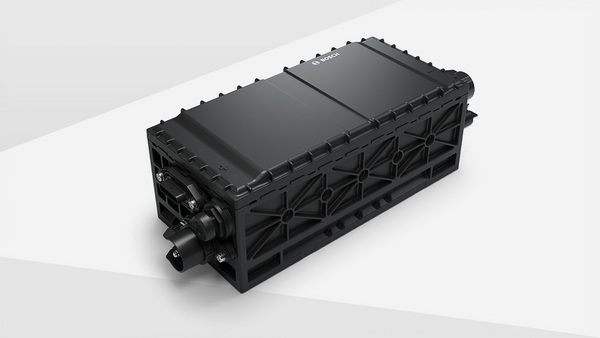48-volt batteries can reduce vehicle carbon emissions by up to 15 percent. Bosch is known as the technology leader in this field and offers auto manufacturers a powerful and clever solution with its mild-hybrid battery. An adhesive from DELO plays a substantial role in its integration.
Its most important property is its good thermal conductivity of 1.0 W/(m·K). This means that battery cells can not only be bonded into the battery housing. The heat generated during operation can also be dissipated efficiently. As a result, the adhesive combines structural bonding and thermal management system mounting in one step instead of having to manually fix battery cells and then use gap fillers for heat dissipation. Saving one process step, this adhesive simplifies production.
The product specially developed for Bosch is flame-retardant in accordance with the industry standard UL 94 V-0, designed for the entire temperature range of the battery, and offers high strength on battery cells and typical housing materials. Its tensile shear strength on aluminum is 18 N/mm². It has also been optimized for manufacturing processes; easy to detect through cameras, it allows Bosch to carry out precise application control and, thus, high quality assurance.
Highlight: Robust cells and a clever cooling function
The 48 V systems from Bosch are so compact that they allow vehicle manufacturers maximum flexibility during installation. The battery measures just 140 millimeters in height. This means it can be placed in discreet places such as the trunk or under the passenger seat. The key to the compact design lies in its thermal design. Bosch has worked with partners to develop particularly robust lithium-ion cells. They even work at temperatures of up to +75 °C. Thanks to their greater heat resistance, a simpler cooling concept is possible.
As automakers work toward an emissions-free future, mild-hybrid systems play an important role. In their powertrains, 48-volt batteries serve as the core element. By supplementing power to the internal combustion engine, they help reduce fuel consumption, thus CO₂ emissions as well. As a cost-efficient introduction to electrification, they benefit both manufacturers and consumers. Bosch expects 20 percent of all cars and light commercial vehicles sold to be powered by mild-hybrid powertrains by 2025. 48-volt batteries from Bosch can already be found in many vehicles around the world.






